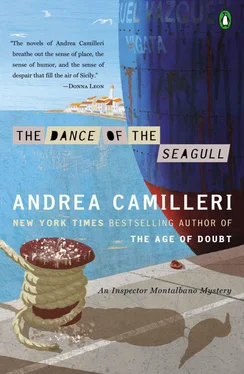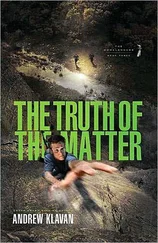
The inspector’s hunch turned out to be wrong.
By the time the sun started to set, the two frogmen, who’d worked for three straight hours, hadn’t found a thing.
Or, more precisely, they’d found everything but the kitchen sink, even a baby buggy and a suitcase full of jars of tomato sauce. Luckily, however, no dead body.
“So much the better,” said Montalbano.
Meanwhile, a few dozen people had gathered in the general vicinity and were craning their necks, looking on, talking, laughing, asking questions out loud that nobody answered. Montalbano felt only contempt for them.
Then a man approached him and said he was the owner of one of the cold storage houses.
“Sorry to bother you, Inspector. But I need to know what we’re supposed to do.”
“What you’re supposed to do about what?”
“About the fishing boats.”
“But there isn’t a single one here.”
“In about two hours they’re going to start coming in.”
“So?”
“With the frogmen working right in front of the warehouses, they won’t be able to dock and unload.”
“Don’t worry. We’ll be done in fifteen minutes.”
“Mind telling us what you’re looking for?” the man asked in dialect. It put them on common ground.
“Sure. My watch. It fell in the water this morning.”
“They said you dropped your gun in the water.”
“I was wrong. I always get the two confused.”
4
When Mimì and the inspector straggled back to the station, it was almost nine P.M. Neither had found the time to eat anything. Or, more precisely, they could have taken an hour or so to eat something, had they wanted, but the truth was that neither of them had felt like it.
“Did Fazio ever show up, by any chance?” he asked Catarella.
“Nossir, Chief.”
They went into Montalbano’s office.
“Have a seat, Mimì. Let’s brainstorm for another five minutes. Shall I send for some coffee?”
“Good idea.”
Montalbano picked up the phone.
“Cat, could you go get us a couple of coffees at the bar? Thanks.”
They eyed each other.
“You first,” said Mimì.
“By this point it’s clear they’ve got Fazio. Whether dead or alive is another question.”
“Well, he wasn’t in the sea, at any rate.”
“But that still doesn’t mean we know he’s alive.”
“Agreed. But if they got him with the second shot, the one fired around the storehouses, where’d they put him?”
“Mimì, we’re unable to come up with an answer for one simple reason. Namely, we don’t know what happens when the trawlers come in, how much time they take to unload, at what time they leave the storehouses to go to their berths, how long the refrigerator trucks stay there before leaving with their cargoes of fish . . . To put it simply, what sort of activity is there around there at that time of the night?”
“The Customs officer said he’d heard the shots just before four A.M., and that between three and four o’clock, everything had been quiet.”
“Fine, but what does ‘quiet’ mean? That there wasn’t a soul around? That’s not possible; there must still be some people about, even at that hour. In fact, the Customs agent said he saw a motorcycle drive past after he’d heard the two shots. So there must still have been somebody there.”
The door flew suddenly open and crashed against the wall. Mimì and the inspector both leapt out of their chairs. Augello cursed under his breath. Catarella appeared, holding a little tray with both hands, his right foot still in midair.
“Sorry ’bout that, ’spectors, I kinda miscaliculated the strinth o’ my kick.”
He set the tray down on the desk.
“Listen, Cat, did anyone call for Fazio today?” the inspector asked him.
Catarella thrust a hand into his pocket and pulled out his little black notebook. Licking the tip of his index finger, he started skimming through it.
Mimì gawked at him in astonishment.
“Less see. Blank an’ Loccicciro called.”
“But not the others?”
“Sarravacchio came poissonally in poisson.”
“So the only one who didn’t call for him was Manzella.”
“’Ass azackly azack, Chief.”
“I haven’t understood a fucking thing,” said Augello as Catarella was leaving.
The coffee was good. And the inspector told him about Manzella’s phone calls.
“So,” said Mimì, “in your opinion, Manzella didn’t call today because he knows exactly what happened to Fazio.”
“It’s fairly likely.”
“So what do we do now?”
“You’re going to go home to Beba and the kid.”
“And what about you?”
“I’m going to rest a little right here and then go back to the wharf to see how the fishing business operates.”
He was leaving the room when the phone rang.
“Chief? ’At’d be the newsman Zito onna line.”
“Put ’im on . . . Ciao, Nicolò, how are you doing? Haven’t heard from you for a while. How’s the wife?”
“Fine, thanks. Listen, are you going to be at the office a little longer?”
“Actually, no, I was just about to go out.”
“Home?”
“No. Why do you want to know?”
“No reason, just to make conversation.”
“No, Nicolò, you’re not being straight with me. What is it?”
“I just wanted to know something. Tell you what. If you’re in a hurry, put Fazio on. I’ll ask him.”
“He’s not here.”
“Did he go home?”
“I don’t know.”
“All right, I’ll try calling him anyway.”
“No!”
Damn, he’d said it too loudly!
When Zito replied, he seemed to falter.
“Sorry, but what—”
“Look, Nicolò. The fact is that his wife . . . isn’t feeling so good and he’s really worried . . . You know?”
“I understand. All right, good night.”
Had Nicolò Zito actually swallowed the whopper he’d just fed him?
Whatever the case, that phone call from his friend and Free Channel newsman had seemed a little strange to him, no doubt about it.

When he got to the wharf, a few trawlers were already moored in front of the storehouses and unloading their hauls. The floodlights for illuminating the area of activity were all turned on. One could see, in the distance, at the mouth of the harbor, the navigation lights of the other trawlers coming in.
A veritable babble of shouts, curses, and commands could be heard above the din of the boats’ diesel motors, the trucks’ engines, and the continual rumble of the freezers.
In the small spaces between one storehouse and the next, which were narrow alleyways of sorts, the inspector discovered a great hubbub of makeshift fish stands, with crates of fish being sold by the crew members of the trawlers themselves. And it wasn’t the rejects they were selling, but the share due each member of each boat. The buyers, after a sort of tug-of-war of bargaining, would then load the crates onto scooters or three-wheeled Ape pickups and drive off. They must have been restaurant owners or employees, who were thus assured not only of having fresh fish, but of paying half of what they would have paid at the town market.
Montalbano remembered the trawler owner who had come to the station. What was his name? Ah, yes, Rizzica. He had to be around there somewhere.
He stopped a municipal police officer he saw carrying a crate of fish. It had to have been the guy’s payoff for closing an eye to the makeshift market in the alleyway.
“I’m Inspector Montalbano, and I’d like to know—”
Читать дальше













